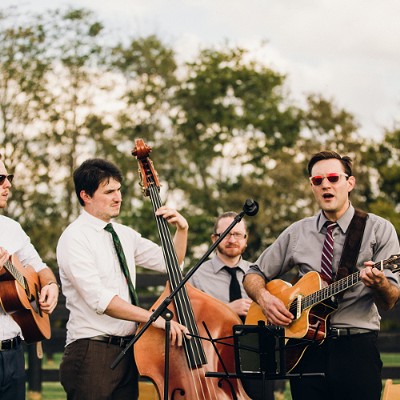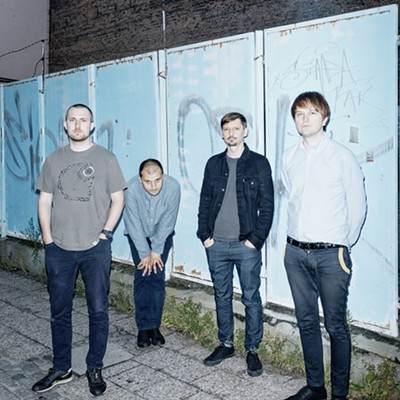Oh, I knew it was Austin, Texas, but I didn't realize just how different this Austin was from the one I visited last year, and so many years previous.
Austin is a true anomaly: a bastion of liberalness that takes its politics seriously (especially considering who's sitting in the Oval Office right now), in a state certainly not known for its liberal leanings. During the week of SXSW, add to that 1,200 bands and performers looking to make their mark, plus thousands more music industry professionals and hangers-on.
The air was charged, to say the least.
Unlike, say, last year's conference, in which the talk of the town was the imminent demise of the recording industry as we know it (this year, that issue was essentially taken for granted), SXSW 2003 was set against a rather eerie backdrop of imminent war. Every showcase I attended, I couldn't help but anticipate The Moment when the performer would comment on the issue of the day.
The Moments came with regularity.
There was David Lowery, of the reunited '80s ethno-folk-punks Camper Van Beethoven, announcing during the final moments of their triumphant week-ending set that his father, a proud 30-year veteran of the military, was opposed to this war. This came following Lowery name-checking Dubya in "Joe Stalin's Cadillac," and the overly violent handling, by security, of a war protester who jumped on stage to rant for about five minutes.
There was Yo La Tengo opening their set with a cover of Sun Ra's "Nuclear War."
There was Tucson's Joey Burns, who wore a NO WAR button during Calexico's Austin sets, and led his band into "Black Heart" from their latest, most accomplished album to date, Feast of Wire, with a brooding, bluesy snippet of "Ohio," Neil Young's response to the Kent State riot of 1970.
There was underground rapper El-p, during the Def Jux label showcase, announcing defiantly, "I am an American!" to the dictionary definition of a "smattering" of applause. In reference to when the song was actually written, he continued, "If I had said that four years ago, you would have reacted a lot differently," before imploring, "THIS COUNTRY IS GOING TO HELL, RIGHT NOW!" It was one of the scarier moments of the week, because with the air of fear abounding, the statement seemed indisputable. And downright frightening.
There was the 7,000-person peace march from the capitol down Congress Street
And there was the national reportage of Austin's own Natalie Maines, frontwoman of the world's most popular country band, the Dixie Chicks, remarking to a British concert audience, "Just so you know, we're ashamed the president of the United States is from Texas." Obviously, the statement went over like a lead zeppelin in most of Texas, as well as with the typically conservative country music audience at large. With the Dixie Chicks being pulled from radio playlists faster than you could whistle "Dixie," Maines' apology came with haste.
Then there was writer Neal Pollack, whose output is divided between "fictional non-fiction"--satire which lambastes columnists whose self-importance overshadows the subject they're writing about (think Dominick Dunne)--and heartfelt, if controversial, works of non-fictional commentary. In the latter camp falls, "Just Shut Up," a response to a pro-war article written by Christopher Hitchens and an anti-war piece by cartoonist Ted Rall (all ran in Seattle alt-newsweekly The Stranger). Pollack argues that it's fine to have opinions on the war, that, in fact, it would be idiotic not to, but that no one really cares to hear what educated minds have to say on the subject because it generally devolves into either over-emotional or pseudo-intellectual blather.
During a set by his band, the Neal Pollack Invasion, Pollack stuck to humor in the face of others' more blunt comments. After performing a cover of Johnny Cash's "Folsom Prison Blues," Pollack, echoing the Maines controversy, claimed that following a recent performance of the song, he had made the statement that George W. Bush is "a big, dumb faggot that fucks little girls." But when country radio refused to play the song anymore, he realized the error of his ways and rescinded the comment by announcing that he now "loves George Bush" and that he's already begun work on his next album, which "will feature seven Fleetwood Mac covers."
All of which adds up to nearly nothing in the face of a president that is going to do whatever the hell he wants to do, regardless of public sentiment, nationally and internationally. But then again, if people are quiet about their opposition, how will anyone know what that sentiment is, or that opposition even exists?
I discussed the Dixie Chicks situation with an artist manager, whose take, typical of an artist manager, is that performers should simply keep their mouths shut. He cited "Hanoi" Jane Fonda as an example of why it's, in his words, "career suicide" to let an artist's political views get in the way of their entertainment. I kept my mouth shut, but what I wanted to say was, "Tell that to anyone from Woody Guthrie and Bob Dylan to Bruce Springsteen, The Clash, and Rage Against the Machine," all artists whose careers have been founded on the notion that keeping their mouths shut would be tantamount to silent compliance. Smiling and nodding through times that warrant comment was never an option for these guys, so why should it be for other politically minded artists now?
The first band I saw once I arrived back in Tucson was the Bigger Lovers, opening for Bobby Bare Jr. at Plush. For the band's final song, dedicated to "a certain administration," they covered the Soft Boys' "I Wanna Destroy You." Following the set, one of the band's members told me, "We're the most apolitical band you'll ever find, but doing that song just seems right, right now."
And for a moment, my mind was put at ease knowing that, at least, the voice of dissent had carried outside of Austin. In times of war, the small battles mean everything.










